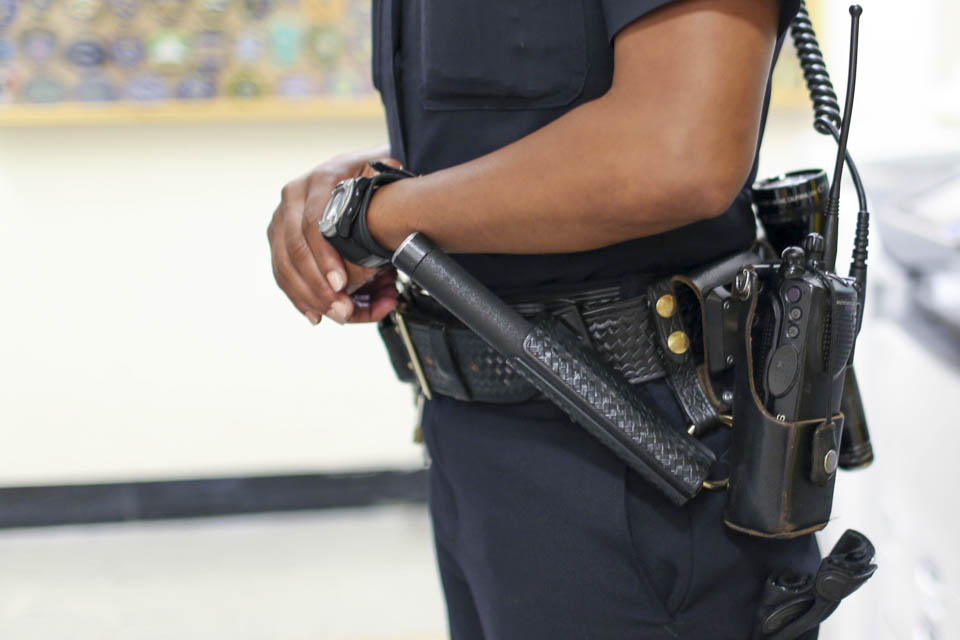City College officials consider arming campus police

By J.B. Evans
The Guardsman
City College police being armed with guns was a recent topic brought up before Chancellor Arthur Tyler during a Sept. 5 Listening Tour. The debate has resumed at City College over whether or not the school’s police officers should be allowed to carry guns on campus and has been a hot topic raised and dismissed intermittently for the last 12 years.
“As we all know, our officers are not armed,” Tyler said. “Is that the most preferred way to do business? Probably not. People have to feel safe and secure in order to have an environment where you can learn.”
City College remains one of only two community colleges in California that prohibits its officers from having guns. Although campus police undergo annual firearm training and are ready to be armed, there is no current proposal to equip the department with guns.
“We are looking to be armed,” Public Information Officer Tiffany Green said. Green is a 5-year City College Police Department veteran. “We’ve had a lot of circumstances where we have people on campus who have weapons. It would be a safer option for the department if we were armed.”
City College must request help from officers at the San Francisco Police Department at the Ingleside station anytime there is a situation on campus in which a violent weapon is suspected to be present. The amount of time it takes for SFPD to respond, according to Green, can take as long as 5-10 minutes, or even longer. As a result, City College officers worry that law enforcement agents will be unprepared in the event of a major campus emergency.
“The ultimate concern is an active shooter,” Green said. “If we were to be an unarmed agency, we wouldn’t be able to immediately do anything about it.”
Other members of the City College community have echoed Green’s concerns. Although many students and faculty recognize that there exists a larger external political debate about guns and violence in society, they recognize that this debate is not equivalent to the issue of how to best protect the immediate safety of students on campus.
“Ultimately, the question comes down to if there’s an incident, how many minutes before there’s a response?” said Louis Schubert, a political science professor at City College. “I think that the onus is probably more on the public safety side to explain why this is important and why it is a student-safety question.”
Some observers, however, point to skirmishes between police and students that took place during a Feb. 21 campus protest as evidence that campus police should not carry guns. While protesting against Special Trustee Robert Agrella’s alleged mishandling of the accreditation crisis, students were pepper-sprayed, beaten with batons, and detained for attempting to occupy Conlan Hall, the administrative building at the college’s ocean campus.
“The police completely misused their force,” said Sarah Thompson, a member of the American Federation of Teachers Local 2121, City College’s faculty union. “If they can’t show any more discretion than that, then they shouldn’t have guns. It’s ridiculous.”
Likewise, many students have expressed apprehension over the idea of City College officers carrying guns. The presence of armed campus police, some students fear, could disrupt the unique urban learning community that is City College.
“This is a place to learn and feel safe,” said Ricardo Pinell, a 3rd-year student studying administration of justice. “I think tasers would be more suitable than guns. People might feel threatened if police officers have guns.”
Despite the controversial nature surrounding any decision on whether or not to arm City College police, the college’s students, faculty, and staff will have ample time to discuss the issue. The school’s administration has not determined an official process for how to engage in a community-wide conversation about police and guns, let alone taken any sort of concrete steps toward making such an important decision.
“One of the things that perhaps we should do is have a discussion through the participatory governance process to determine whether or not we should continue the way we are and whether or not that unarmed status for our police officers is satisfactory,” Tyler said.
According to the Chancellor’s Office, no participatory governance process will occur without the approval of an elected Board of Trustees. The State Chancellor is expected to submit a proposal with regards to the restoration of an elected Board of Trustees at the November meeting of the Board of Governors.
In the meantime, City College campus police plan to continue developing strategies to address campus safety concerns. On Oct. 17, the police department will host a presentation for faculty, staff, and students that will give information on how to respond should a violent intruder enter campus before police arrive. The presentation will take place from 2 p.m. to 4 p.m. in MUB 140.

Comments are closed.